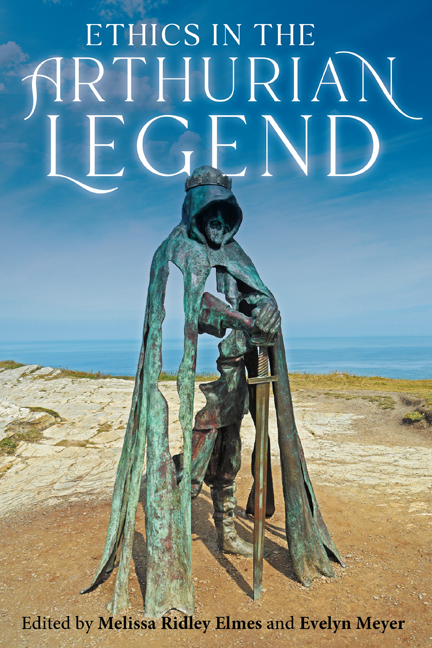Book contents
- Frontmatter
- Contents
- List of Contributors
- Foreword
- Acknowledgments
- Introduction
- 1 Arthurian Ethics before the Pentecostal Oath: In Search of Ethical Origins in Culhwch and Olwen
- 2 Too Quickly or Not Quickly Enough, Too Rash and Too Harshly: The Arthurian Court’s Lack of Ethics in Hartmann von Aue’s Erec and Iwein and Wolfram von Eschenbach’s Parzival
- 3 The Ethics of Arthurian Marriage: Husband vs Wife in Hartmann von Aue’s Iwein
- 4 Arthurian Ethics and Ethical Reading in the Perlesvaus
- 5 Translation Praxis and the Ethical Value of Chivalry in the Caligula Brut
- 6 Imperial Ambitions and the Ethics of Power: Gender, Race, and the Riddarasögur
- 7 Lowland Ethics in the Arthur of the Dutch
- 8 Contesting Royal Power: The Ethics of Good Lordship, Sir Gawain and the Green Knight, and the March of Wales
- 9 “As egir as any lyoun”: The Ethics of Knight-Horse Relationships in Lybeaus Desconus
- 10 Malory’s Ethical Dinadan: Moderate Masculinity in a Crisis of Hypermasculine Chivalry
- 11 Virtus, Vertues, and Gender: Cultivating a Chivalric Habitus in Thomas Malory’s Tale of Sir Gareth
- 12 Kingly Disguise and (Im)Perception in Three Fifteenth- Century English Romances
- 13 “Adventure? What is That?” Arthurian Ethics in/and the Games We Play
- 14 The Ethics of a New Edition of Sir Thomas Malory’s Le Morte Darthur – and More Evidence for the Superiority of the Winchester Manuscript
- 15 The Ethics of Writing Guinevere in Modern Historical Fiction
- Afterword
- Index
Introduction
Published online by Cambridge University Press: 10 January 2024
- Frontmatter
- Contents
- List of Contributors
- Foreword
- Acknowledgments
- Introduction
- 1 Arthurian Ethics before the Pentecostal Oath: In Search of Ethical Origins in Culhwch and Olwen
- 2 Too Quickly or Not Quickly Enough, Too Rash and Too Harshly: The Arthurian Court’s Lack of Ethics in Hartmann von Aue’s Erec and Iwein and Wolfram von Eschenbach’s Parzival
- 3 The Ethics of Arthurian Marriage: Husband vs Wife in Hartmann von Aue’s Iwein
- 4 Arthurian Ethics and Ethical Reading in the Perlesvaus
- 5 Translation Praxis and the Ethical Value of Chivalry in the Caligula Brut
- 6 Imperial Ambitions and the Ethics of Power: Gender, Race, and the Riddarasögur
- 7 Lowland Ethics in the Arthur of the Dutch
- 8 Contesting Royal Power: The Ethics of Good Lordship, Sir Gawain and the Green Knight, and the March of Wales
- 9 “As egir as any lyoun”: The Ethics of Knight-Horse Relationships in Lybeaus Desconus
- 10 Malory’s Ethical Dinadan: Moderate Masculinity in a Crisis of Hypermasculine Chivalry
- 11 Virtus, Vertues, and Gender: Cultivating a Chivalric Habitus in Thomas Malory’s Tale of Sir Gareth
- 12 Kingly Disguise and (Im)Perception in Three Fifteenth- Century English Romances
- 13 “Adventure? What is That?” Arthurian Ethics in/and the Games We Play
- 14 The Ethics of a New Edition of Sir Thomas Malory’s Le Morte Darthur – and More Evidence for the Superiority of the Winchester Manuscript
- 15 The Ethics of Writing Guinevere in Modern Historical Fiction
- Afterword
- Index
Summary
This book began with two questions: how do we define “ethics?” And, how do we define “Arthurian ethics” more explicitly? We do not intend to answer these questions because, as Jane Gilbert noted in her 2009 essay “Arthurian Ethics,” they cannot be answered in any homogenous, one-size-fits-all way: “no single idea of the ‘good’ governs all Arthurian works.” In much the same way that we understand there is no single, overarching definition of “King Arthur” as a person, character, or figure, so must we, often to our frustration, acknowledge there is no single, overarching definition of “ethics” or of “Arthurian ethics.” This premise is the basis for the essays in this collection.
While we do not define ethics as a homogenous term or Arthurian ethics as a monolithic enterprise, it is helpful to remember that the earliest appearance of the term “ethics” in vernacular English texts is in the fourteenth century, entering into the English language from the French following the Norman conquest and by the thirteenth century and, far earlier, originating in Latin in the writings of Quintilian and transmitted to England through British Latin texts in the twelfth century. Coming from the French éthique, the definition is “of or related to moral principles” and from the Latin ēthicus, “belonging to morals, ethical, expressive of character, psychological” deriving from the still earlier Greek ἠθικός, “moral; showing moral character,” and, in the plural, “manners.” In all its earliest iterations in English, first attested in works such as John Trevisa's 1387 translation of Ralph Higden's Polychron and Geoffrey Chaucer's 1386 Legend of Good Women, the word is used to describe the branch of knowledge or study dealing with moral principles; it isn't until 1659 that the word is divested of its ties to the concept of study to simply mean “A system or set of moral principles; a set of social or personal values.” This matters because, when we are investigating the idea of ethics in medieval texts, we locate it specifically employed as a branch of study or of knowledge dealing with moral principles – that is, ethics in medieval texts are a didactic program embedded within the narrative, intended to help the reader think through moral concerns.
- Type
- Chapter
- Information
- Ethics in the Arthurian Legend , pp. 1 - 7Publisher: Boydell & BrewerPrint publication year: 2023

